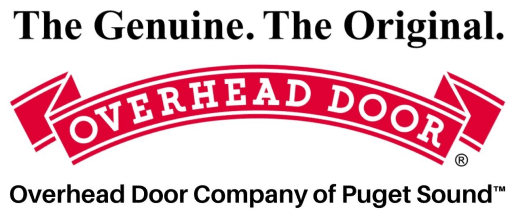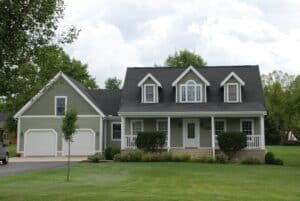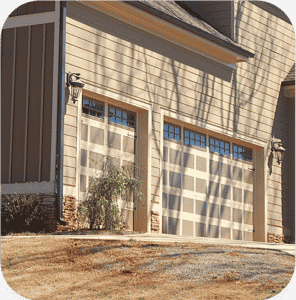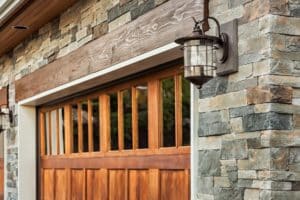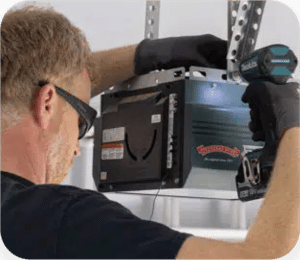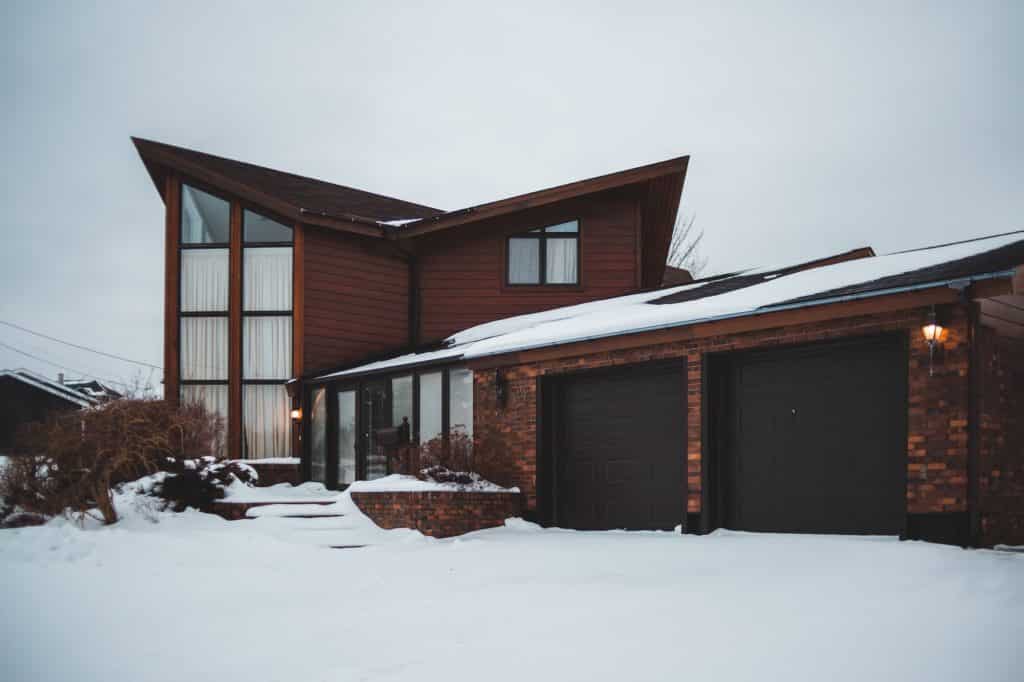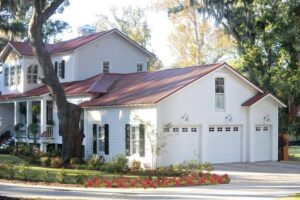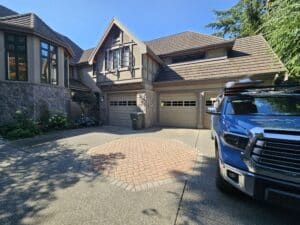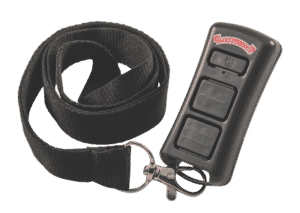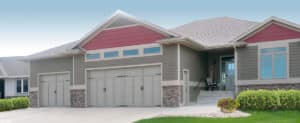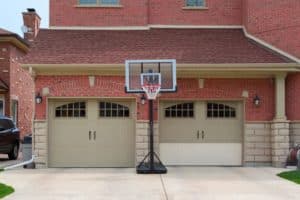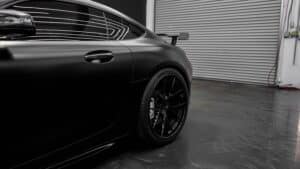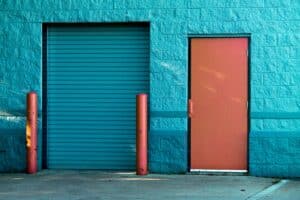Have you been hearing a popping, hissing, scraping, gnawing, squeaking, rattling, or rubbing sound coming from your garage door recently? If so, there are several potential culprits.
In today’s article, we are highlighting some common garage door issues that cause different distinctive noises to occur. We will also offer solutions on how to fix the problem and make the sound go away.
It’s time to arrange a garage door checkup to find out what’s actually going on if your garage door is producing noises and not working properly. Contact an expert repair technician to thoroughly evaluate the situation because certain garage door parts can create a safety risk.
What Are Common Causes of a Loud Garage Door?
A loud garage door can be caused by wear and tear and mechanical issues. Here are the most common reasons for loud garage doors:
Loose Hardware
Nuts, bolts, and screws on the garage door and its tracks can loosen, causing rattling or banging noises during operation.
Lack of Lubrication
Hinges, rollers, and springs need lubrication to minimize friction. Without it, they can squeak or grind.
Worn Rollers
Metal rollers or worn-out rollers can produce a grinding or squealing noise as they move along the tracks. Replacing them with quieter nylon rollers reduces noise.
Track Misalignment
Bent or misaligned tracks can create loud scraping or screeching sounds while the door moves.
Worn or Damaged Springs
Garage door springs under tension can make creaking or popping noises as they age. Broken springs can also produce sudden, loud snapping sounds.
Noisy Opener
Chain-driven garage door openers are usually louder than belt-driven ones. A poorly maintained or outdated opener may contribute to excessive noise.
Clicking Noise
If your garage door is making a clicking noise, it may indicate an issue with your opener, like a malfunctioning motor, worn drive gear, or faulty safety sensors. It could also be loose hardware, misaligned tracks, or worn rollers.
Unbalanced Garage Door
An unbalanced door puts extra strain on the opener and springs, leading to noisy operation.
Debris in the Tracks
Dirt, dust, or other debris in the tracks can create grinding or rattling noises as the door moves.
Worn Weatherstripping
Old, cracked, or stiff weatherstripping can cause the door to rattle or make noises during operation.
Vibrations and Metal Contact
Vibrating metal parts like the track and brackets, can amplify noises. Rubber pads or insulation can reduce this.
- Addressing these issues with monthly maintenance, lubrication, and inspections often resolves noise. Loud noises can mean something is wrong with your garage door so it’s important to have it checked. When your garage door is making noise but not opening, reach out to an Overhead Door professional technician.
How Can Lubrication Reduce Garage Door Noise?
Lubrication reduces garage door noise by minimizing friction between moving parts, preventing metal-on-metal contact, and ensuring smooth operation. Noises that squeak, grind, or creak are caused by hinges, rollers, tracks, and springs drying out. You can minimize noisy vibrations by using garage door lubricant. Lubricant prolongs the life of door parts and lowers the risks of wear and tear.
Could Misaligned Tracks Be Causing My Garage Door to Be Loud?
Your garage door may be noisy if the tracks are misaligned. The rollers may have trouble moving smoothly and produce grinding, screeching, or scraping noises if tracks are twisted or improperly positioned. Alignment problems and noise reduction can be fixed by routinely checking and adjusting the tracks or by seeking advice from a professional. Regularly check the area for debris because objects on the tracks can also cause problems.
Can the Type of Garage Door Opener Influence Noise Levels?
The type of garage door opener you have can influence noise levels. Because of the vibrations and rattling noises produced by its metal chain and other parts, chain-driven openers are the loudest. Screw-driven openers can still make noise, particularly if they are not well-lubricated. The quietest openers have a belt drive, which uses a rubber belt to reduce noise and vibration.
What Role Does Insulation Play in Garage Door Noise?
Insulation reduces garage door noise by dampening vibrations, absorbing sound, and minimizing the hollow, echoing noises common in non-insulated doors. Insulated doors’ multi-layer construction reduces shaking by adding weight and durability. Insulation keeps outside noises from reverberating inside.
How Often Should I Perform Maintenance to Keep My Garage Door Quiet?
A maintenance checkup should be performed on your garage door at least twice a year to keep it operating quietly. Upkeep includes tightening loose hardware, lubricating moving parts like rollers, hinges, and springs, and removing any debris from the track. Weatherstripping, rollers, and other parts should be inspected for wear and tear. To guarantee silent, smooth operation, consider more frequent checks if your garage door is used often. Regular maintenance prolongs the life of your garage door system and reduces noise.
What Impact Do Worn Hinges Have on Garage Door Noise?
Worn hinges sometimes increase garage door noise by creating squeaking, creaking, or grinding sounds when the door moves. Hinges can become less smooth due to rust, dirt buildup, or wear, leading to friction between parts. The added strain causes noise and affects the door’s balance door, causing issues. Replacing or lubricating worn hinges reduces these noises. To prevent hinge wear from getting worse, schedule maintenance.
Can Improper Spring Tension Contribute to Garage Door Noise?
When operating the door, snapping or slamming sounds can be created by springs that are either too tight or too loose. Excessive strain on springs due to high tension raises the possibility of damage and noise. Uneven movement and loud noises may result from springs that are not tensioned enough to withstand the weight of the door.
A broken torsion spring can’t be repaired, so the entire spring needs to be replaced. Ensuring proper spring tension with professional maintenance or adjustment reduces noise and keeps the garage door operating safely. Don’t attempt to repair a spring yourself, because garage door springs can be dangerous and cause injuries.
How Does the Age of My Garage Door Affect Its Noise Level?
The noise level of your garage door may vary depending on its age. Increased friction from wear and tear on springs, rollers, and hinges can generate loud noises. Older doors may have outdated hardware that’s noisy. Regular upkeep is important, but if the door is old, it could be better to replace it with a more recent, quieter garage door.
How To Stop Garage Door From Making Noise
Broken Torsion Spring
Broken garage door springs can cause your garage door to make a very loud popping sound. A broken torsion spring can spell bad news because it is not serviceable, meaning that the entire spring must be replaced when it breaks.
The reason we are concerned about a broken, noisy torsion spring is that it greatly affects the operation of your door and it can become quite dangerous. Garage doors operate on springs and levers. When the springs, which are loaded with an enormous amount of tension, break, you cannot use your automatic garage door opener to lift the door anymore, and the door will not stay in an open position. In that instance, people often try to manually lift the heavy door, and they end up injuring themselves or others.
Solution
Replace broken torsion springs before they cause more damage and force you to pay more for garage door repair than you already have to. You’ll want to call professional garage door repair services to handle this problem for you. Springs are dangerous, and replacing them involves a certain level of disassembly that would not be safe for the average homeowner to attempt on their own.
If you are having this issue or any other garage door issue, and you’re living in Puget Sound, garage door repair services are right around the corner. Contact Overhead Door Company of Puget Sound today. After being in the business for over 100 years, they’ve seen everything, and they have the best solutions for you! Don’t risk your safety, or the safety of your loved ones just to save a few bucks. The experienced professionals at Overhead Door Company have your back.
Overhead Door Company specializes in everything, including garage door repair services, garage door installation, repairing or replacing garage door openers, and they can even get you a brand new garage door if necessary. As a garage door company, they strive to build relationships and make the process as painless as possible.
Debris in the Tracks
Debris in the tracks can make garage doors emit a scraping or gnawing sound, especially if it gets lodged somewhere solid. This could happen when anything from ice and pebbles to twigs and leaves become stuck somewhere along the way.
Solution
Make sure to inspect the area under your garage doors for any objects that may have fallen and affected how well your garage door closes and opens. If you find an object lodged in the tracks, remove it as soon as possible. another thing you can do is perform routine sweeping in your garage to minimize the amount of debris lying around in your garage.
Broken or Loose Hardware
Tightening loose hardware can make your garage door much quieter. Common causes of noise are loose hinges, rollers, and rails, which all need to remain tight regularly for maximum efficiency.
It could also be the case that your garage door’s hardware is beginning to rust, or perhaps some of the screws are being stripped. This can happen when your door isn’t exactly aligned, so pressure gets put on one side or another, wearing out the hardware quicker.
Solution
There are a few solutions to loose, broken, and noisy hardware.
First, if you find that your garage door’s hinges are too loose, you will need to tighten them with the appropriate screwdriver size; typically an inch-pound torque wrench will do the trick. Check all screws on your garage door (including the ones underneath) to ensure they are properly fastened.
Second, replace bad screws if you’re comfortable doing so.
Third, try some garage door lubricant, especially if it just seems that the hinges are squeaking. The acoustics in a garage can heighten the amount of noise coming from the door, which can be rather annoying sometimes. Often, applying a cheap lubricant is enough to make it go away, and your door should operate more smoothly as well.
If none of these solutions are effective, you may have a more serious problem with your garage door. At that point, it’s suggested that you contact a professional garage door repair company to inspect your door. They will give you suggestions for repair, recommend a new garage door, or provide any other necessary treatment.
Worn Garage Door Rollers
Sometimes, your rollers, the circular pieces of hardware that are responsible for allowing the garage door to roll smoothly up and down the tracks, may emit a grinding sound. They might just need a little touch-up, or it might require garage door service from a professional garage door company.
Solution
Firstly, before you jump right to calling for garage door repair assistance, try lubricating the rollers with a generic lubricant. You can purchase this at any hardware store. Sometimes, they just get a little rough and they need to be oiled up.
If that doesn’t work, their lifespan may be shot, and you’ll have to hire a professional garage door service company to replace one or all of them for you. It’s not recommended that you go out, get the necessary garage door parts, and do this on your own. This type of door repair isn’t like buying new batteries for your garage door opener. This is serious stuff, and there is potential for serious injury.
There’s a Garage Door Repair Solution for You!
Garage door issues are very common, and they usually have obvious causes that can be easily fixed. If you hear any of the noises described above, then hopefully the article above has provided a viable solution for you!
Garage door problems usually have clear causes so call Overhead Door of Puget Sound to investigate your garage door issues. Our technicians offer same-day emergency services when you need them, as well as thorough assessments, garage door repair, and replacement to ensure your door operates safely and properly.
If you’re still struggling to fix the problem, or your garage door is making a different noise than the situations described above, give Overhead Door Company of Puget Sound a call today! Their experienced garage door specialists offer emergency same-day service, and they’ve been fixing and replacing residential garage doors in the greater Puget Sound area for over 100 years!
